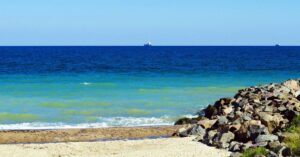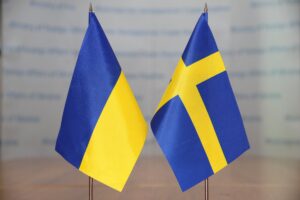
Samples of sea water in the water area of Odessa showed an excess of pollutants and a sharp drop in salinity due to the Russian occupants of the dam of the Kakhovskaya hydroelectric power plant on the Dnieper, but no cholera pathogens were detected, according to the Telegram channel of the Odessa City Hall “Odessa. Officially” on Tuesday.
“In samples of seawater sampled on June 10 from points in Odessa cholera pathogen and cholera-like vibrios were not detected … In samples of seawater sampled at the beach “Langeron” excess of iron in 4.8 times, salinity below the norm in 2.7 times; in samples taken at the 16-th station B. Fountain samples recorded excess of suspended solids in 1.8 times, iron – in 5.2 times, the salinity is 2.9 times below the norm,” the statement said.
At the same time, it is reported that the drinking water supplied to Odessa complies with sanitary norms. “Drinking water corresponds to the State sanitary norms and rules 2.2.4-171-10 “Hygienic requirements for drinking water intended for human consumption”, – reported in the City Hall.
The Odessa City Council reminded that the order of the Odessa Regional Military Administration of July 16, which established a special mode of movement of citizens in certain areas of the Odessa region, prohibits staying on the Black Sea coast, in particular within the beach areas, is still in force.

The European Parliament adopted updated EU regulations on the allocation of efforts to reduce the maximum allowable level of greenhouse gas emissions in member states at a plenary session in Strasbourg on Tuesday.
The bill was approved by 486 votes, with 132 against and 10 abstentions.
The said novelty establishes mandatory annual greenhouse gas emission reductions for motor vehicles, building heating, agriculture, small industrial plants and waste management for each EU member state.
“The revised law increases the 2030 greenhouse gas emission reduction target at the EU level from 30 percent to 40 percent from 2005 levels. For the first time, all EU countries must now reduce greenhouse gas emissions with targets ranging from 10% to 50%,” according to the European Parliament’s communiqué on the vote.
The document explains that the 2030 targets for each member state are based on GDP per capita and economic efficiency indicators. EU countries will have to ensure that they do not exceed their annual quotas on greenhouse gas emissions every year.
In addition, the updated regulation includes “limits on the ability to trade, borrow and save emissions.”
“There are limits on how much emissions member states can save in previous years, borrow from future years, and how much they can trade allowances with other member states,” the European Parliament explained.
The text of the new law must now be formally approved by the EU Council, after which it will be published in the Official Journal of the European Union and enter into force in 20 days.

Ukraine and Romania have agreed to strengthen cooperation in the Danube region and cooperation in the field of environmental protection, in particular, the countries are preparing to sign a bilateral agreement on the implementation of the Convention on Environmental Impact Assessment in a Transboundary Context (Espoo Convention).
The corresponding decision was made by Minister of Environment Protection and Natural Resources of Ukraine Ruslan Strelets and Minister of Environment, Water and Forests of Romania Barna Tanczos during an online meeting on June 27, according to the website of the Ukrainian ministry.
The Ukrainian minister also spoke about the harm done to the environment since the start of Russia’s large-scale invasion of Ukraine, and expressed hope for Romania’s support in recovering damages from the aggressor in the international court.
“About 260 cases of ecocide in the country and more than 2,000 cases of destruction of our ecosystems have already been recorded. The amount of damage exceeds UAH 200 billion. Such a war will definitely leave huge scars on the Ukrainian environment. Ukraine has joined the Life family, and we have great hopes that within the framework of the program, among other things, we will be able to restore our wildlife,” Strelets said.
He also recalled that Ukraine has introduced the EkoZahroza official application of the Ministry of Natural Resources, which allows every inhabitant of the planet to receive data around the clock on all changes in environmental indicators on the Ukrainian territory, including radiation pollution.
The Espoo Convention is an international agreement initiated by the United Nations Economic Commission for Europe that entered into force in 1997. According to the document, the procedure for assessing the environmental impact of potentially hazardous projects should be carried out not only within the state, but also in neighboring countries that may be affected by the impact of these facilities.
On June 24, Ukraine and the EU signed an agreement on joining the Life international environmental program, the budget of which for 2021-2027 for projects to protect the environment is EUR 5.43 billion.

Prime Minister of Ukraine Denys Shmyhal met with Prime Minister of Sweden Stefan Leuven on October 13 as part of a working trip to the Kingdom of Sweden, where the parties discussed the development of bilateral relations between the countries.
The press service of the government said on Wednesday evening that Shmyhal expressed gratitude to the Swedish side for organizing the International Forum on Holocaust Remembrance and Combating Anti-Semitism, as well as for Sweden’s participation in the inaugural summit of the Crimea Platform in August this year.
He also noted the support provided by the Swedish government for the implementation of the decentralization reform and thanked for the assistance provided through the Swedish Radiation Safety Authority for Ukrainian nuclear power plants.
“Diversification of nuclear fuel sources is one of our priorities in the context of ensuring energy security. In addition, Ukraine has met all the technical conditions for joining its integrated power system to the European ENTSO-E network. For us, this will be an important step towards energy independence,” Shmyhal said.
The parties also discussed issues of cooperation in the field of waste disposal and recycling.
The head of government said that investments and an increase in investment activity can become a driver for the development of economic relations between the countries. He urged Swedish companies to continue implementing joint projects in Ukraine, in particular taking advantage of the law on the so-called “investment nannies”.
Shmyhal also said that Ukraine is ready to further develop cooperation in the field of information technology, in particular in terms of digitalization and strengthening cyber security.

A bill on limiting the use of disposable plastic products may be registered at the Verkhovna Rada in October, Minister of Environmental Protection and Natural Resources Roman Abramovsky has said.
According to him, the bill provides for a year after its adoption, a ban on production, import and sale of a number of disposable plastic goods in Ukraine, which are proposed to be replaced with similar ones made from alternative harmless materials, including corn starch.
“From such materials, practically without changing the technology, you can make the same products as from plastic. There will be no big problems for re-equipment of production. We are constantly in contact with business and manufacturers, and most confirm that significant transformations will not be needed […] We came to the conclusion that it is inexpensive, 10-15% of capital investments,” the minister said during a press breakfast in Kyiv on Wednesday.
The bill proposes to limit the use of plastic disposable tableware, cutlery, straws, food containers, lids for drinks containers, sanitary cotton swabs, plastic base-holders for balloons and other products made from polystyrene and oxo-biodegradable plastic.
In addition, special labeling is provided for goods that do not fall under the restrictions (wet wipes, feminine hygiene products, diapers, cigarettes with filters).
At the same time, manufacturers of such products are subject to extended liability, in particular, they will be required to recycle a certain share of the plastic produced.
“The discussion about liability is still ongoing, although the bill is already ready for registration. This is a difficult issue, since excessive liability is associated with corruption risks. Today, the following figures are proposed: the primary fine for the provision of prohibited products on the market is from UAH 18,000 to UAH 51,000, repeated violation within one year – from UAH 85,000 to UAH 175,000,” Abramovsky said.
At the same time, the minister noted the lack of statistical information on production of plastic products in Ukraine.
The situation of reservoir pollution is critical in Ukraine!
The Dnieper River is annually contaminated with tons of garbage and emissions from different enterprises. Most people know about this problem but keep throwing away garbage and polluting our wonderful river.
There are a lot of beach areas near the river and waste affects our health. Together we can not only clean the riverfront but also get out trash of the river on canoes in the sports rhythm.

Our journalists talked to the organizers of the action, SD Platform non-governmental organization, and discovered all the details.
“Sometimes we see our Dnieper river through rose-colored spectacles. But putting them off, we can notice how much dirt, plastics and strange things are in the river. We have gathered activists who care about its destiny. We made the Dnieper cleaner on our own,” Kateryna Davydkova, a coordinator of the environmental sector at SD Platform, said.
Plastics, bottles, toys and even stolen stuff are just a brief list of the “treasure” found by activists in the Dnieper. This garbage was left by common vacationers who don’t want to keep the Dnieper clean.
“We found a bag with car and apartment keys, a purse, personal documents and bank cards. Without losing any time, we found the owner of lost things via Facebook and returned them the next day. The things have been in the water for more than a year. Thus, the environmental action is referred not just to reservoir rescue, but also to good deeds like in this case,” Said Mechkour, a foreign student of International European University, added.
Be eco-friendly conscious! If you like resting near the Dnieper, throw away your trash in a garbage can so that other activists won’t find your “treasure”.
Let’s make our river cleaner by small but progressive steps!
ALLA NAVOLOKINA, ECOLOGY, FRANZ_VLADIMIR_FON_GABSBURG_LOTHRINGEN, IEU